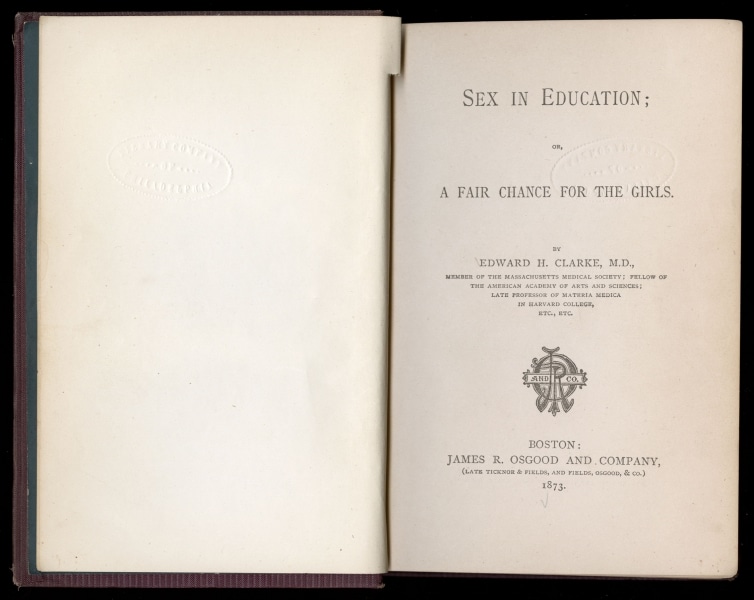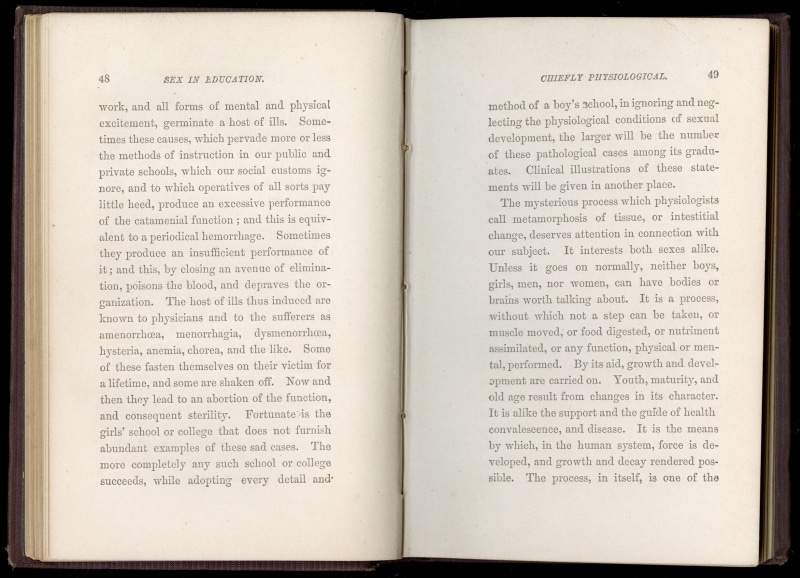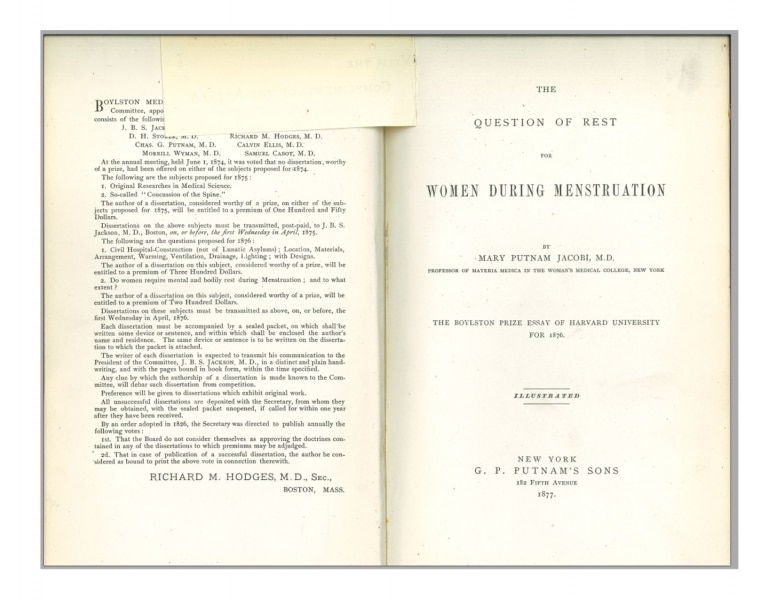Period Politics: The 19th-Century Debate over Menstruation
Cornelia King, Chief of Reference and Curator of Women’s History
In 1873, retired Harvard professor Edward H. Clarke’s Sex in Education, or, A Fair Chance for the Girls provoked controversy. In the book, Clarke states unequivocally that girls’ physiology requires that they not be educated in the same manner as boys. In particular, if they perform labor—including academic study—during their “periodical hemorrhage,” it can result in amenorrhoea (absence of a menstrual period), anemia, chorea (involuntary jerky movements), hysteria, and even sterility.
Not surprisingly, supporters of gender equality found fault with Clarke’s book. In Woman’s Education, and Woman’s Health (Syracuse, 1874), husband-and-wife team George and Anna Comfort state that Clarke’s argument is “utterly wrong in all its essential features.” George Comfort was a professor at Syracuse University and Anna Comfort was a practicing physician, having graduated from New York Medical College for Women.
In her No Sex in Education (Philadelphia, 1874), Eliza B. Duffey characterizes Clarke’s book as a “covert blow against the desires and ambitions of woman in every direction except a strictly domestic one.” In Sex and Education (Boston, 1874), Julia Ward Howe asserts that Clarke was primarily motivated by his antipathy toward the women who organized an 1872 campaign to raise money and petition Harvard to admit women. (Their efforts failed, despite raising $75,000.)
Another book that came out in 1874 in response to Clarke’s Sex in Education (1873) was The Education of American Girls (New York, 1874), which was edited by Anna C. Brackett (whose Brackett School for Girls in New York City prepared girls for college, and especially for Vassar, which admitted Brackett graduates without any entrance examination). The volume includes a chapter by Mary Putnam Jacobi, in which Jacobi rebuts Clarke’s claims using the methodology and language of science. Jacobi links menstruation with health and vitality, not frailty. She concludes that rest during the “menstrual week” would be ineffectual if the regime in the other three weeks was not healthful. [Editorial aside: Not all healthy women can say that they have never been at all incapacitated during menstruation. In this matter, Jacobi’s own social values and experience may have influenced her.]
Jacobi’s essay brought her to the attention of someone on the committee that awarded Harvard’s Boylston Medical Prize, many of whom regarded Clarke’s views on menstruation as unscientific. Apparently, that member passed word to Jacobi through a mutual friend that she should submit an essay for their consideration in 1876, the year the subject of rest during menstruation was a proposed topic. Significantly, at a time when Harvard faculty refused to admit women to either Harvard College or Harvard Medical School, they did award the Boylston Prize to Jacobi for her essay “The Question of Rest for Women during Menstruation,” with its tables of measurements and test results from her study of women over the course of a month.
As a winner of the Boylston Prize, Jacobi received a great deal of attention, and her family’s firm G.P. Putnam’s Sons published an extended version of the essay in 1877. Notably, our copy is an ex-library copy, which Jacobi herself sent to Dr. Henry J. Bigelow. We cannot say this with certainty, but Dr. Bigelow may have been the member of the Boylston Committee who encouraged Jacobi to submit her essay for consideration.
In the aftermath of the controversy over Clarke’s book, Jacobi continued her career in medicine, as a medical practitioner and as a member of the teaching faculty at Woman’s Medical College of the New York Infirmary—and also as a medical researcher, publishing over 120 articles in medical journals. For example, she wrote on women’s hysteria being a result of society’s failure to produce gender equality. As a professional woman, wife, and mother, Jacobi represented her core belief in gender equality, and the importance of women utilizing medical science to revise the cultural understanding of women’s potential.
For more on Jacobi and her contemporaries:
Bittel, Carla Jean. Mary Putnam Jacobi & the Politics of Medicine in Nineteenth-Century America (Chapel Hill: University of North Carolina Press, 2009).
Johnson, Joan Marie. Funding Feminism: Monied Women, Philanthropy, and the Women’s Movement, 1870-1967 (Chapel Hill: University of North Carolina Press, 2017).





